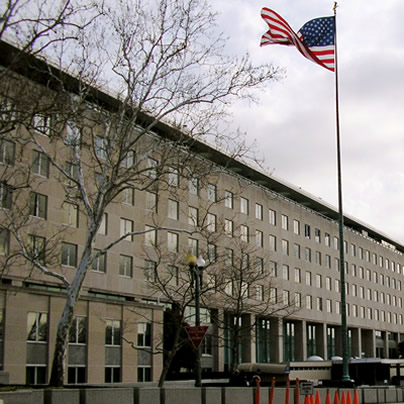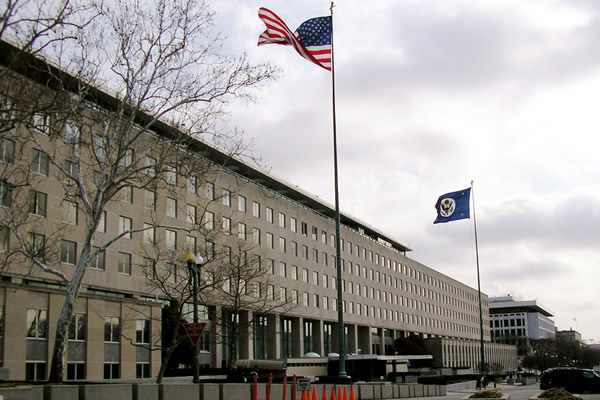News
State Dept. pledges to raise concerns over Nigeria anti-gay law
Says United States does ‘regret’ passage of restrictive legislation


The State Department says the United States does ‘regret’ passage of the anti-gay law in Nigeria. (Photo public domain)
State Department Deputy Spokesperson Marie Harf said on Monday the United States “will keep raising” concerns about Nigeria’s new anti-gay law, but maintained the relationship between the two countries will continue.
Under questioning from the Washington Blade, Harf said the State Department does “regret” the signing of the legislation by Nigerian President Goodluck Jonathan as she emphasized the country has a right to pass legislation through the democratic process.
“We just don’t support any legislation that institutionalizes discrimination against one select group of people, and I think one of the key reasons we are opposed to this is that the law goes far beyond prohibiting same-sex marriage,” Harf said. “It restricts freedom of assembly, association and expression for all Nigerians.”
As Secretary of State John Kerry noted in a statement earlier in the day, Harf said the law is “inconsistent” with the country’s international legal obligations and rights under its constitution.
“Obviously, we’ll keep raising these issues when they come up,” Harf said. “We’ve made our position on this very clear. It may make some work in the country harder to do, but we clearly have a relationship there that’s an important one, and we’ll continue working together.”
The law bans not only same-sex marriage and same-sex “amorous relationships,” but also membership in LGBT rights groups.
The Associated Press reports it’s now a crime in the country “to have a meeting of gays, or to operate or go to a gay club, society or organization.” Further, entering into a same-sex marriage contract or civil union is punishable by up to 14 years’ imprisonment.
During the briefing, Harf conceded that she didn’t immediately have a lot of information about the law, such as which international obligations it violates and whether the State Department had any prior knowledge Jonathan would sign the measure. Although she said she hasn’t heard any talk about possible sanctions against the country or a potential loss of aid as a result of the law, Harf said she’d have to double check.
But Harf was able to confirm that State Department officials were in contact with a variety of principals in Nigeria prior to the signing of the legislation.
“Since the law was in draft form, we’ve been in continual contact with the Jonathan administration, the National Assembly and a wide variety of Nigerian stakeholders,” Harf said. “Our conversations have been focused on our concerns that portions of the law, again, appear to restrict Nigerians’ rights to freedom of expression, assembly and association — provisions that we’ve been very clear we do not support.”
Harf wasn’t able to immediately identify who was representing the United States in those talks, including whether it was a senior diplomat or someone in a lower position.
According to the Associated Press, Nigeria is one of the top crude oil suppliers to the United States. A report from the U.S. Energy Information Administration indicates the U.S. oil imports from Nigeria are decreasing, but the United States imported 161,558 barrels of oil from the country in 2012.
News that the anti-gay legislation was signed in Nigeria is breaking after earlier reports a man in Cameroon died after being previously jailed for texting a same-sex partner and the Uganda parliament approved its own anti-gay legislation.
Harf said she wasn’t immediately able to say whether the State Department is concerned about an anti-gay trend in Africa, but maintained the Obama administration supports LGBT rights everywhere.
“We’ve talked about it elsewhere — whether it’s Russia, here or elsewhere — that we believe that LGBT rights are human rights, there’s no place for discrimination anywhere, such as this,” Harf said.
A partial transcript of the exchange between the Blade and State Department follows:
Washington Blade: Secretary Kerry issued a statement earlier today saying he’s “deeply concerned” about the passage of the anti-gay law in Nigeria, which contains punishments of up to 14 years in prison. Will passage of that law impact U.S.-Nigeria relations?
Marie Harf: Well, we did release a statement, and I would just note that we do regret that this bill, passed by Nigeria’s national assembly. was signed into law on Jan. 7.
Obviously, we respect the sovereignty of the Federal Republic of Nigeria and the prerogatives of its national assembly to pass legislation. We just don’t support any legislation that institutionalizes discrimination against one select group of people, and I think one of the key reasons we are opposed to this is that the law goes far beyond prohibiting same-sex marriage.
It restricts freedom of assembly, association and expression for all Nigerians. It’s inconsistent with Nigeria’s international legal obligations and undermines the democratic reforms and human rights protections enshrined in Nigeria’s constitution.
Obviously, we’ll keep raising these issues when they come up. We’ve made our position on this very clear. It may make some work in the country harder to do, but we clearly have a relationship there that’s an important one, and we’ll continue working together.
Blade: You just said it’s inconsistent with Nigeria’s international legal obligations. To which obligations are you referring?
Harf: I can check specifically with our attorneys and see what they intended with this part of the statement. Obviously, freedom of assembly, association and expression are topics we talk about a lot in terms of legal obligations, and also, anti-discrimination obligations as well. I can check if there’s more legal specifics to share.
Blade: Were there any conversations between State Department officials and Nigeria prior to the signing of this legislation?
Harf: There were. Let me what I have here. Since the law was in draft form, we’ve been in continual contact with the Jonathan administration, the National Assembly and a wide variety of Nigerian stakeholders. Our conversations have been focused on our concerns that portions of the law, again, appear to restrict Nigerians’ rights to freedom of expression, assembly and association — provisions that we’ve been very clear we do not support.
Blade: And who was representing the United States in those talks?
Harf: I can double-check and see who the specifics there are. I don’t have that in front of me.
Blade: The statement that the secretary put out was embargoed until an announcement from the Nigerian government. Did the State Department know this law was going to be signed beforehand?
Harf: I can check on that. Obviously, we’ve been discussions since it was in draft form and it passed. We were in discussions with the administration. I’m happy to check on that. Obviously, we allow governments to speak for themselves before we speak publicly about things as well.
Blade: Could sanctions or a loss of aid be on the table as a result of this law?
Harf: I haven’t heard talk of any of that. I’m happy to check with our folks. Again, we’ve made very clear what our position is on this, and I just don’t have a ton more on it. So, I know you probably have ten follow ups, but I’m happy to take them and see if I can answer them, but then we’ll move on.
Blade: Let me ask you one last question then. The news is breaking just after a man in Cameroon died after being sentenced for being gay and after Uganda passed its own anti-gay legislation — the parliament there. Is the State Department concerned about a larger trend in Africa about passage of anti-gay legislation?
Harf: I’m happy to check with our folks and see if there’s a trend that they’re concerned about. We speak very clearly for LGBT rights across the globe. We’ve talked about it elsewhere — whether it’s Russia, here or elsewhere — that we believe that LGBT rights are human rights, there’s no place for discrimination anywhere, such as this. So, we’re very clear whether it’s Africa or somewhere else that this is something we feel very, very strongly about. President Obama and the secretary have all made very clear statements to that regard. And I’m happy to check if there’s more details on this if you have more follow-ups.

The Mexican Senate on Thursday approved a bill that would ban so-called conversion therapy in the country.
Yaaj México, a Mexican LGBTQ rights group, on X noted the measure passed by a 77-4 vote margin with 15 abstentions. The Chamber of Deputies, the lower house of Mexico’s congress, approved the bill last month that, among other things, would subject conversion therapy practitioners to between two and six years in prison and fines.
The Senate on its X account described conversion therapy as “practices that have incentivized the violation of human rights of the LGBTTTIQ+ community.”
“The Senate moved (to) sanction therapies that impede or annul a person’s orientation or gender identity,” it said. “There are aggravating factors when the practices are done to minors, older adults and people with disabilities.”
Mexico City and the states of Oaxaca, Quintana Roo, Jalisco and Sonora are among the Mexican jurisdictions that have banned the discredited practice.
The Senate in 2022 passed a conversion therapy ban bill, but the House of Deputies did not approve it. It is not immediately clear whether President Andrés Manuel López Obrador supports the ban.
Canada, Brazil, Belgium, Germany, France, and New Zealand are among the countries that ban conversion therapy. Virginia, California, and D.C. are among the U.S. jurisdictions that prohibit the practice for minors.
The White House
Four states to ignore new Title IX rules protecting transgender students
Biden administration last Friday released final regulations

BY ERIN REED | Last Friday, the Biden administration released its final Title IX rules, which include protections for LGBTQ students by clarifying that Title IX forbids discrimination based on sexual orientation and gender identity.
The rule change could have a significant impact as it would supersede bathroom bans and other discriminatory policies that have become increasingly common in Republican states within the U.S.
As of Thursday morning, however, officials in at least four states — Oklahoma, Louisiana, Florida, and South Carolina — have directed schools to ignore the regulations, potentially setting up a federal showdown that may ultimately end up in a protracted court battle in the lead-up to the 2024 elections.
Louisiana State Superintendent of Education Cade Brumley was the first to respond, decrying the fact that the new Title IX regulations could block teachers and other students from exercising what has been dubbed by some a “right to bully” transgender students by using their old names and pronouns intentionally.
Asserting that Title IX law does not protect trans and queer students, Brumley states that schools “should not alter policies or procedures at this time.” Critically, several courts have ruled that trans and queer students are protected by Title IX, including the 4th U.S. Circuit Court of Appeals in a recent case in West Virginia.
In South Carolina, Schools Supt. Ellen Weaver wrote in a letter that providing protections for trans and LGBTQ students under Title IX “would rescind 50 years of progress and equality of opportunity by putting girls and women at a disadvantage in the educational arena,” apparently leaving trans kids out of her definition of those who deserve progress and equality of opportunity.
She then directed schools to ignore the new directive while waiting for court challenges. While South Carolina does not have a bathroom ban or statewide “Don’t Say Gay or Trans” law, such bills continue to be proposed in the state.
Responding to the South Carolina letter, Chase Glenn of Alliance For Full Acceptance stated, “While Supt. Weaver may not personally support the rights of LGBTQ+ students, she has the responsibility as the top school leader in our state to ensure that all students have equal rights and protections, and a safe place to learn and be themselves. The flagrant disregard shown for the Title IX rule tells me that our superintendent unfortunately does not have the best interests of all students in mind.”
Florida Education Commissioner Manny Diaz also joined in instructing schools not to implement Title IX regulations. In a letter issued to area schools, Diaz stated that the new Title IX regulations were tantamount to “gaslighting the country into believing that biological sex no longer has any meaning.”
Governor Ron DeSantis approved of the letter and stated that Florida “will not comply.” Florida has notably been the site of some of the most viciously anti-queer and anti-trans legislation in recent history, including a “Don’t Say Gay or Trans” law that was used to force a trans female teacher to go by “Mr.”
State Education Supt. Ryan Walters of Oklahoma was the latest to echo similar sentiments. Walters has recently appointed the right-wing media figure Chaya Raichik of Libs of TikTok to an advisory role “to improve school safety,” and notably, Raichik has posed proudly with papers accusing her of instigating bomb threats with her incendiary posts about LGBTQ people in classrooms.
The Title IX policies have been universally applauded by large LGBTQ rights organizations in the U.S. Lambda Legal, a key figure in fighting anti-LGBTQ legislation nationwide, said that the regulations “clearly cover LGBTQ+ students, as well as survivors and pregnant and parenting students across race and gender identity.” The Human Rights Campaign also praised the rule, stating, “rule will be life-changing for so many LGBTQ+ youth and help ensure LGBTQ+ students can receive the same educational experience as their peers: Going to dances, safely using the restroom, and writing stories that tell the truth about their own lives.”
The rule is slated to go into effect Aug. 1, pending any legal challenges.
****************************************************************************

Erin Reed is a transgender woman (she/her pronouns) and researcher who tracks anti-LGBTQ+ legislation around the world and helps people become better advocates for their queer family, friends, colleagues, and community. Reed also is a social media consultant and public speaker.
******************************************************************************************
The preceding article was first published at Erin In The Morning and is republished with permission.
South America
Argentina government dismisses transgender public sector employees
Country’s Trans Labor Quota Law enacted in 2021

Protests have broken out across Argentina in recent weeks after the dismissal of transgender people from their government jobs.
President Javier Milei’s action is in stark contract with the progress seen in 2023, where the government’s hiring of trans people increased by 900 percent within the framework of the Trans Labor Quota Law that had been in place since 2021.
Among those affected is Sofia Diaz, a “survivor” who shared her testimony with the Washington Blade hours after she traveled from Chaco Province to Buenos Aires to protest her dismissal.
Presentes, an LGBTQ news agency, reported the government dismissed more than 85 trans employees in less than two weeks.
Diaz, 49, holds a degree in combined arts. She joined the National Social Security Administration (ANSES) in 2022 under the Trans Labor Inclusion Law. The layoffs began in January and left many people feeling uncertain and anguished. It was her turn a few days ago.
Diaz in an interview recounted how the situation became progressively more complicated, with difficulties in accessing information about her employment status and the eventual confirmation of dismissals through WhatsApp messages. This government action, according to Diaz, violates the law.
“We were on a Friday, I think on March 24, in the office and we have a WhatsApp group of other colleagues from all over Argentina who entered through the trans labor quota and they tell us if we can get our pay stubs on the intranet,” Diaz recalled. “So, I tried to enter, I could not, I talked to two other colleagues and they told me no, they could not, and so we went to another person. He couldn’t either.”
“Some people told us that it could be a system error. Well, we were never calm, let’s say not how this issue of installing fear and the perversion with which they do it ends,” she added. “This sadism of … inflicting pain and speculating with your misfortune and so on … is something that characterizes Javier Milei’s government.”
Diaz recalled a list of those dismissed from the agency began to circulate from the union in the afternoon. A colleague passed it on to her, “and well, unfortunately I was also on that list.”
“At that moment the whole weekend went by with anguish, crying, and talking with other colleagues from other places, not only trans, but everyone, everyone and everyone,” she said. “On Monday when we went to try to enter, we could not enter with the biometric, which is the thumb we had to use every morning to enter.”
Despite the difficult moment through which she is going, the trans activist stressed to the Blade that she will continue protesting and will even sue the government because her dismissal is illegal and “violates the constitution itself.”
The LGBTQ community and its allies have mobilized and organized demonstrations, highlighting the importance of defending the rights won and fighting against discrimination and exclusion. Diaz emphasized the fight is not only for the people affected today, but also for future generations, saying the historical memory of the struggles for inclusion and social justice must be kept alive.
“The Argentine government thus faces a key challenge in human and labor rights, where public pressure and social mobilization can play a determining role in protecting the rights of LGBTQ+ people,” Diaz said.
-

 State Department3 days ago
State Department3 days agoState Department releases annual human rights report
-

 Maryland5 days ago
Maryland5 days agoJoe Vogel campaign holds ‘Big Gay Canvass Kickoff’
-

 Politics4 days ago
Politics4 days agoSmithsonian staff concerned about future of LGBTQ programming amid GOP scrutiny
-

 District of Columbia1 day ago
District of Columbia1 day agoCatching up with the asexuals and aromantics of D.C.











